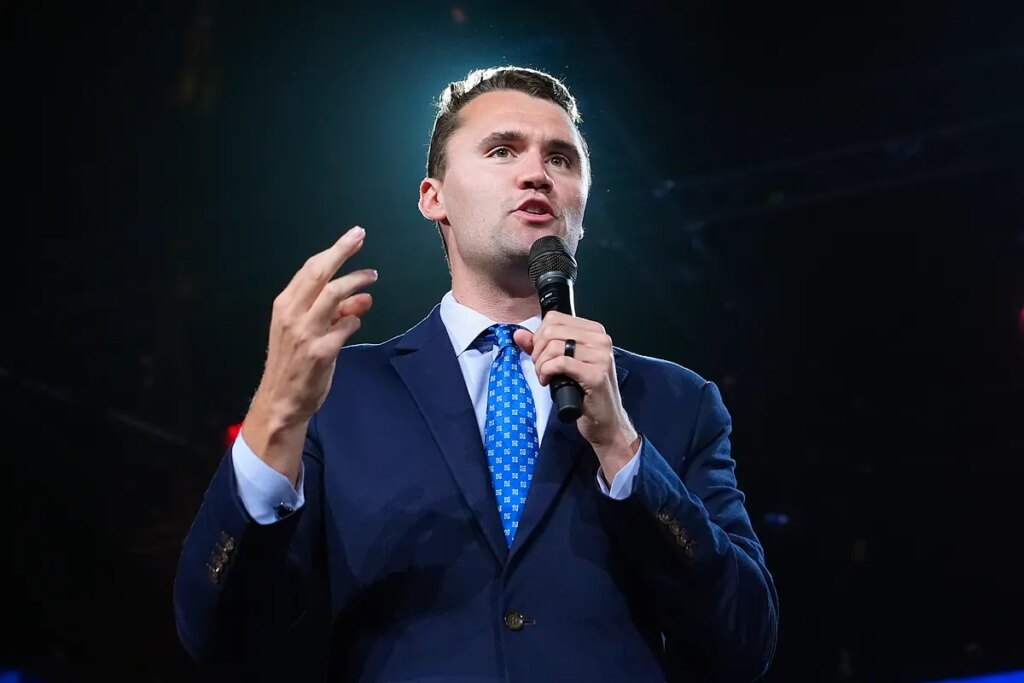The sudden death of conservative activist Charlie Kirk in Utah has left the political world reeling, and sparked an unexpected wave of reaction inside the NBA.
For some players, the news was a moment to set aside politics and offer condolences to a grieving family. For others, it opened the door to criticism, controversy, and reminders of how deeply divisive Kirk‘s legacy had become.
Former Boston Celtics forward Kris Humphries was among the first athletes to publicly acknowledge the tragedy.
Posting to Instagram, Humphries shared a photo of Kirk with his wife and two children, accompanied by a brief message: “Rest in Peace Charlie. Love is the answer,” alongside an American flag.
It was a simple gesture of compassion, a reminder that empathy can transcend politics. Yet even in its simplicity, the post underscored the tension between mourning a life and confronting the rhetoric Kirk embodied.
New York Knicks center Mitchell Robinson quickly discovered just how fraught that line can be. He too posted a photo of Kirk’s family, writing: “I feel bad for his family.”
The reaction from fans was swift and unforgiving, with Robinson accused of aligning himself with Kirk’s politics rather than merely sympathizing with a loss.
Feeling the pressure, Robinson followed up with a longer statement.
“I’m never the type to get into the political field,” he explained. “I just don’t get how people get so sensitive and offended about someone else’s opinion or beliefs.
“As a father myself, no kid should have to grow up without their father or mother at the end of the day.”
His clarification did little to quiet the debate. For critics, any tribute to Kirk overlooked years of inflammatory comments; for others, Robinson’s focus on family resonated as the most human reaction possible.
A divided response inside and outside basketball
Not every voice from the NBA community offered condolences. Former Washington Wizards forward Etan Thomas took a more nuanced stance.
“I am not going to celebrate Charlie Kirk‘s death; that doesn’t even feel right to do,” he wrote. “But I’m certainly not going to pretend that he was some hero who deserves a statue and the Congressional Medal of Honor.”
The tension extended into sports media as well. PHNX Sports fired Suns reporter Gerald Bourguet after comments he made online questioning those who mourned Kirk and drawing comparisons to other tragedies.
His dismissal ignited a separate debate over free speech and accountability, illustrating just how combustible the conversation had become.
Part of the intensity stems from Kirk himself. The 31-year-old founder of Turning Point USA built his reputation on provocation, often targeting athletes and the NBA for what he called a “woke agenda.”
He sparred publicly with LeBron James, criticized the league’s social justice stances, and thrived on controversy.
Admirers praised him as a bold truth-teller who energized conservative youth; detractors viewed him as a dangerous figure who spread division.
That duality has carried into the way his death is being processed.
When athletes speak, the backlash follows
The polarized reaction to Humphries, Robinson, and others fits into a broader pattern for the NBA.
The league has long been a flashpoint for the intersection of sports and politics, from Michael Jordan‘s reluctance to take public stances to LeBron James‘ outspoken activism.
For players, every comment, even one meant as a prayer for a grieving family, is scrutinized for political alignment.
Robinson‘s explanation, focused on fatherhood and empathy, highlighted just how difficult it is for athletes to separate humanity from politics in the public eye.
Humphries‘ message was quieter but no less telling: a call for love at a time when even condolences draw controversy.
Charlie Kirk‘s death has forced NBA figures to navigate a minefield that extends far beyond basketball.
For some, silence might have been safer. For others, speaking up was a moral obligation.
The result is a snapshot of how even tragedy becomes politicized in modern America, where athletes’ voices are amplified, and often weaponized, no matter their intent.
As the basketball world continues to grapple with its role in conversations bigger than the game, one truth remains clear: empathy, in today’s climate, rarely comes without consequences.
Read the full article here

